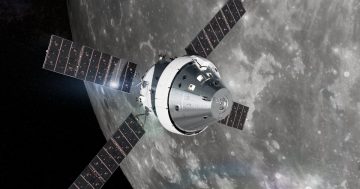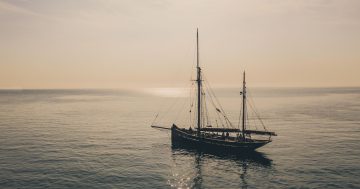Reviewed by Robert Goodman.
By Simon Morden, Hachette, $32.99.
 Despite the shiny versions of the future that we get through science fiction franchises like Star Trek and Star Wars, space is unforgiving and dangerous. And there is plenty of new, harder science fiction around to remind us of that. From the breathless, grasping survivalism of Gravity through the potato-led self-rescue of The Martian to Ian Macdonald’s Luna series where even breathable air has a price and characters (and readers) are constantly reminded that there are “a thousand ways to die on the Moon”. Simon Morden delved into this corner of the genre recently with his two Mars-based survival novels One Way and No Way. Gallowglass takes these ideas up a notch.
Despite the shiny versions of the future that we get through science fiction franchises like Star Trek and Star Wars, space is unforgiving and dangerous. And there is plenty of new, harder science fiction around to remind us of that. From the breathless, grasping survivalism of Gravity through the potato-led self-rescue of The Martian to Ian Macdonald’s Luna series where even breathable air has a price and characters (and readers) are constantly reminded that there are “a thousand ways to die on the Moon”. Simon Morden delved into this corner of the genre recently with his two Mars-based survival novels One Way and No Way. Gallowglass takes these ideas up a notch.
It is the late twenty first century and Jaap “Jack” Van der Veerden has been effectively imprisoned in a luxury estate in Holland by his obscenely wealthy parents who intend for all three to live forever. Jack, in his twenties, is not keen on this plan and organises an escape, in a fantastic opening sequence, to space. But when he arrives at a waypoint to the Moon he finds that the job he was heading for no longer exists, his parents having bankrupted the company he was to work for. Desperate not to return home Jack joins a scratch crew of desperate outcasts as a navigator on a secret mission that promises to make them all rich. That mission is to fly to an asteroid, rescue its claimant (called the “Gallowglass”) who is hibernating on the surface and use a laser to steer the rock back to Lunar orbit for resource extraction.
The rest can be summed up as: space is a harsh mistress, space ship crews are out to protect themselves and nothing ever goes according to plan. Morden, through Jack, explores the lives of a crew, millions of kilometres from help, dealing with unexpected challenges, with death around every corner. Much of the narrative is concerned with the solution of technological and engineering problems while dealing with a fragile social contract between strangers stretched to psychological breaking point. And the last third of the book manages to up the stakes around these problems considerably.
The only strange note in this book is the chapter epigraphs. They start with statements from climate change deniers in early chapters and pass through the scientific consensus to highlight major climate change issues. While there is a climate change angle to the book (the asteroid’s claimant, Cat, is doing so to earn money to save her the drowning community of St Ann), these quotes do nothing to enhance the narrative and if anything are a distraction from the plot.
Morden manages to capture the enervating exhaustion of living in partial gravity, the desperation that comes with knowing you have to earn enough money just to be able to breathe and the tenuous social contract on a ship where a crewmember who steps out of line could literally be voted off the ship by being pushed out of the airlock. He does this through an engaging, if not particularly likeable, main character, and in the context of an extremely believable future impacted by climate change. All of which makes Gallowglass an effective space survival narrative.
This and over 600 more reviews can be found on Pile by The Bed.











